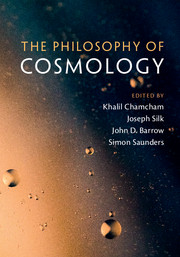Book contents
- Frontmatter
- Contents
- List of Contributors
- Preface
- Acknowledgments
- Part I Issues in the Philosophy of Cosmology
- Part II Structures in the Universe and the Structure of Modern Cosmology
- Part III Foundations of Cosmology: Gravity and the Quantum
- Part IV Quantum Foundations and Quantum Gravity
- Part V Methodological and Philosophical Issues
- 19 Limits of Time in Cosmology
- 20 Self-Locating Priors and Cosmological Measures
- 21 On Probability and Cosmology: Inference Beyond Data?
- 22 Testing the Multiverse: Bayes, Fine-Tuning and Typicality
- 23 A New Perspective on Einstein's Philosophy of Cosmology
- 24 The Nature of the Past Hypothesis
- 25 Big and Small
- Index
- References
21 - On Probability and Cosmology: Inference Beyond Data?
from Part V - Methodological and Philosophical Issues
Published online by Cambridge University Press: 18 April 2017
- Frontmatter
- Contents
- List of Contributors
- Preface
- Acknowledgments
- Part I Issues in the Philosophy of Cosmology
- Part II Structures in the Universe and the Structure of Modern Cosmology
- Part III Foundations of Cosmology: Gravity and the Quantum
- Part IV Quantum Foundations and Quantum Gravity
- Part V Methodological and Philosophical Issues
- 19 Limits of Time in Cosmology
- 20 Self-Locating Priors and Cosmological Measures
- 21 On Probability and Cosmology: Inference Beyond Data?
- 22 Testing the Multiverse: Bayes, Fine-Tuning and Typicality
- 23 A New Perspective on Einstein's Philosophy of Cosmology
- 24 The Nature of the Past Hypothesis
- 25 Big and Small
- Index
- References
Summary
Cosmological Model Inference with Finite Data
In physical cosmology we are faced with an empirical context of gradually diminishing returns from new observations. This is true in a fundamental sense, since the amount of information we can expect to collect through astronomical observations is finite, owing to the fact that we occupy a particular vantage point in the history and spatial extent of the Universe. Arguably, we may approach the observational limit in the foreseeable future, at least in relation to some scientific hypotheses (Ellis, 2014). There is no guarantee that the amount and types of information we are able to collect will be sufficient to statistically test all reasonable hypotheses that may be posed. There is under-determination both in principle and in practice (Butterfield, 2014; Ellis, 2014; Zinkernagel, 2011). These circumstances are not new, indeed cosmology has had to contend with this problem throughout history. For example, Whitrow (1949) relates the same concerns, and points back to remarks by Blaise Pascal in the seventeenth century: ‘But if our view be arrested there let our imagination pass beyond; … We may enlarge our conceptions beyond all imaginable space; we only produce atoms in comparison with the reality of things’. Already with Thales, epistemological principles of uniformity and consistency have been used to structure the locally imaginable into something considered globally plausible. The primary example in contemporary cosmology is the Cosmological Principle of large-scale isotropy and homogeneity. In the following, the aim will be to apply such epistemological principles to the procedure of cosmological model inference itself.
The state of affairs described above naturally leads to a view of model inference as inference to the best explanation/model (e.g. Lipton, 2004; Maher, 1993), since some degree of explanatory ambiguity appears unavoidable in principle. This is consistent with a Bayesian interpretation of probability which includes a priori assumptions explicitly. As in science generally, inference in cosmology is based on statistical testing of models in light of empirical data. A large body of literature has built up in recent years discussing various aspects of these methods, with Bayesian statistics becoming a standard framework (Hobson, 2010; Jaynes, 2003; von Toussaint, 2011). The necessary foundations of Bayesian inference will be presented in the next section.
- Type
- Chapter
- Information
- The Philosophy of Cosmology , pp. 429 - 446Publisher: Cambridge University PressPrint publication year: 2017
References
- 2
- Cited by

